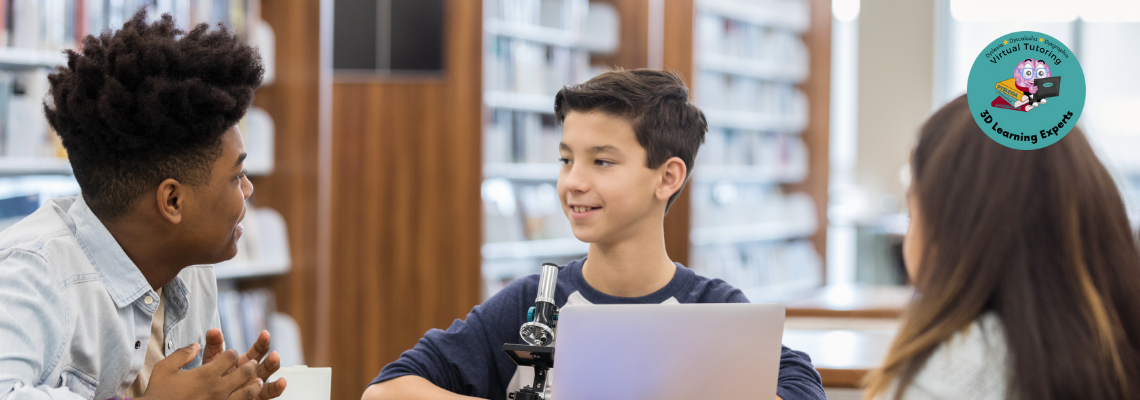Confidence is a crucial component of a child’s academic and personal success. For students with learning disabilities such as Dyslexia, Dysgraphia, Dyscalculia, and ADHD, school can often be a source of frustration and self-doubt. Struggles with reading, writing, or math can lead to feelings of inadequacy, avoidance, and even anxiety about learning.
Fortunately, online tutoring can be a powerful tool in reversing this cycle by providing personalized support, fostering a positive learning environment, and helping children build the skills they need to succeed.
Personalized Learning Boosts Self-Esteem
Traditional classroom settings don’t always accommodate every child’s unique learning style, and students with learning disabilities often need alternative teaching approaches. Students who struggle to keep up may feel left behind, reinforcing self-doubt. Tutoring offers individualized instruction tailored to a child’s specific strengths and challenges. This targeted approach helps children grasp challenging concepts at their own pace, making learning more manageable and boosting their confidence as they experience success.
Encouragement and Positive Reinforcement
A key factor in building confidence is consistent encouragement. A good tutor not only teaches academic subjects but also provides emotional support and motivation. When children receive positive reinforcement for their efforts, they begin to believe in their own abilities. For children with Dyslexia, Dysgraphia, or ADHD, even small successes in reading, writing, or math can build momentum, helping them develop a growth mindset that extends beyond academics.
Developing Effective Learning Strategies
Confidence grows when children feel equipped to tackle challenges. Tutoring helps students develop strong study skills, problem-solving strategies, and independent learning habits. For students with Dyscalculia, for example, tutors can introduce visual aids and step-by-step problem-solving techniques that make math less intimidating. These tools give students the confidence to approach difficult subjects with a sense of control and capability, rather than fear or frustration.
Reducing Anxiety and Fear of Failure
For many children, struggling in school can create significant anxiety. They may dread tests, hesitate to participate in class, or even avoid schoolwork altogether. This is especially true for children with Dyslexia or ADHD, who may have difficulty processing information quickly or staying on task. Tutoring provides a safe, low-pressure environment where students can ask questions, make mistakes, and learn without the fear of embarrassment. As they build competence, their fear of failure diminishes, and they become more willing to take academic risks.
Building a Strong Foundation for Future Success
Confidence gained through tutoring doesn’t just help children in the short term—it sets them up for long-term success. When children learn how to overcome academic challenges, they develop resilience and a belief in their ability to tackle new and difficult tasks. This self-assurance extends beyond school, influencing their willingness to pursue new opportunities and face challenges with a positive mindset.
Frequently Asked Questions
Q: How do I know if my child needs online tutoring? A: If your child frequently struggles with homework, avoids reading, or shows signs of frustration and low self-esteem related to schoolwork, tutoring could provide valuable support.
Q: Can tutoring help with Dyslexia, Dysgraphia, or Dyscalculia? A: Yes! Tutors trained in working with students with learning disabilities use specialized strategies to help them develop skills in reading, writing, and math, making learning more accessible and engaging.
Q: How soon will I see results from tutoring? A: Progress varies by child, but many parents notice improvements in confidence and academic performance within a few months. Consistent tutoring sessions and practice at home can accelerate progress.
Q: What makes tutoring different from classroom instruction? A: Tutoring is personalized to fit your child’s specific learning needs, unlike a traditional classroom where instruction is often generalized for a larger group of students. This individualized approach allows students to learn at their own pace.
Build Confidence in Your Child with Online Tutoring
Tutoring is about more than just improving grades—it’s about transforming a child’s entire outlook on learning, especially for those with learning disabilities. By providing personalized instruction, encouragement, and effective learning strategies, online tutoring can help children replace frustration and self-doubt with confidence and a sense of achievement. When kids believe in themselves, the possibilities for their future become limitless.
Contact us for a free consultation to learn more about our services and how we can help your child build confidence through tutoring and academic success!

